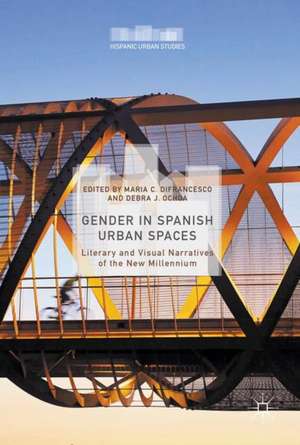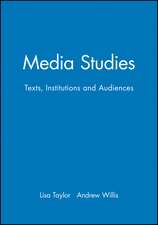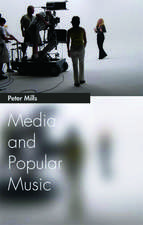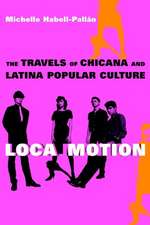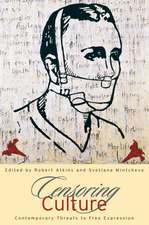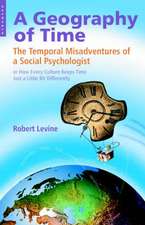Gender in Spanish Urban Spaces: Literary and Visual Narratives of the New Millennium: Hispanic Urban Studies
Editat de Maria C. DiFrancesco, Debra J. Ochoa Cuvânt înainte de Daphne Spainen Limba Engleză Hardback – 17 ian 2018
| Toate formatele și edițiile | Preț | Express |
|---|---|---|
| Paperback (1) | 530.58 lei 6-8 săpt. | |
| Springer International Publishing – 4 iun 2019 | 530.58 lei 6-8 săpt. | |
| Hardback (1) | 711.89 lei 6-8 săpt. | |
| Springer International Publishing – 17 ian 2018 | 711.89 lei 6-8 săpt. |
Preț: 711.89 lei
Preț vechi: 837.52 lei
-15% Nou
Puncte Express: 1068
Preț estimativ în valută:
136.21€ • 142.23$ • 112.48£
136.21€ • 142.23$ • 112.48£
Carte tipărită la comandă
Livrare economică 15-29 aprilie
Preluare comenzi: 021 569.72.76
Specificații
ISBN-13: 9783319473246
ISBN-10: 3319473247
Pagini: 499
Ilustrații: XIX, 402 p. 26 illus. in color.
Dimensiuni: 148 x 210 mm
Greutate: 0.84 kg
Ediția:1st ed. 2017
Editura: Springer International Publishing
Colecția Palgrave Macmillan
Seria Hispanic Urban Studies
Locul publicării:Cham, Switzerland
ISBN-10: 3319473247
Pagini: 499
Ilustrații: XIX, 402 p. 26 illus. in color.
Dimensiuni: 148 x 210 mm
Greutate: 0.84 kg
Ediția:1st ed. 2017
Editura: Springer International Publishing
Colecția Palgrave Macmillan
Seria Hispanic Urban Studies
Locul publicării:Cham, Switzerland
Cuprins
1. Introduction.- 2. Bodies, Spaces, and Transitions in Alberto Rodríguez’s Grupo 7 (2012) and La isla mínima (2014).- 3. The Spaces of Patriarchy in Rafael Chirbes’s En la orilla (2013).- 4. Marking Territory: Violence and Hypermasculinity in Ramon Térmens and Carles Torras’s Joves (2004).- 5. Home and Sexuality: Queering the Notions of Parenting and Space in Cachorro (2004).- 6. Broken Sexualities: Claiming the Right to the City in Maite Carranza’s El fruto del baobab (2013).- 7. On the Affective Politics of Cosmopolitanism: African Migration, Lavapiés, and the Domestic Realm in Lucía Etxebarría’s Cosmofobia (2007).- 8. Defining Mother’s Place in Barcelona: Women in Biutiful (2010).- 9. Re-Creating Space in Cristina Cerezales Laforet’s El pozo del cielo (2013).- 10. From Place to Space: Creating a Utopia in Juan José Millás’s Dos mujeres de Praga (2002).- 11. Precarious Life in the High Rise: Neoliberal Urban Interiors in Rec (2007) and Mientras duermes (2011).- 12. Searching in the City of Lost Memories: Post-March 11th Trauma as Gendered Alienation in Javier Rebollo’s La mujer sin piano (2009).- 13. The Female Façade and the Façade of the Female in the Miniseries El tiempo entre costuras (2013).- 14. The City Unmapped: A Feminist Imagination of Urban Spaces in Javier Pérez Andújar’s Paseos con mi madre (2011).
Notă biografică
Maria C. DiFrancesco is Associate Professor of Spanish and Chair of Modern Languages & Literatures at Ithaca College, USA. She specializes in contemporary Spanish literature and film and has authored many articles and a book, Feminine Agency and Transgression in Post-Franco Spain. She is Vice President of the Northeast Modern Languages Association.
Debra J. Ochoa is Associate Professor of Spanish at Trinity University, USA. She specializes in contemporary Spanish literature and film and has published articles on Pedro Almodóvar, Carmen Martín Gaite, María Teresa León, among other Spanish writers and film directors.
Debra J. Ochoa is Associate Professor of Spanish at Trinity University, USA. She specializes in contemporary Spanish literature and film and has published articles on Pedro Almodóvar, Carmen Martín Gaite, María Teresa León, among other Spanish writers and film directors.
Textul de pe ultima copertă
This edited collection examines the synergistic relationship between gender and urban space in post-millennium Spain. Despite the social progress Spain has made extending equal rights to all citizens, particularly in the wake of the Franco regime and radically liberating Transición, the fact remains that not all subjects—particularly, women, immigrants, and queers—possess equal autonomy. The book exposes visible shifts in power dynamics within the nation’s largest urban capitals—Madrid and Barcelona—and takes a hard look at more peripheral bedroom communities as all of these spaces reflect the discontent of a post-nationalistic, economically unstable Spain. As the contributors problematize notions of public and private space and disrupt gender binaries related with these, they aspire to engender discussion around civic status, the administration of space and the place of all citizens in a global world.
Caracteristici
Offers analyses of cultural productions ranging from Madrid to Barcelona, Seville to Valencia Illustrates how class, ethnicity, and race intersect with sexual identity as manifested in Spanish cities Provides a methodological blueprint for combining spatial theory and gender studies discourses across urban studies Includes supplementary material: sn.pub/extras
